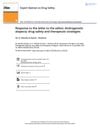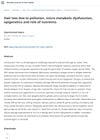 17 citations,
January 1995 in “The American Journal of Medicine”
17 citations,
January 1995 in “The American Journal of Medicine” The document concludes that proper diagnosis and tailored long-term treatment can effectively manage androgenic disorders in women, improving patient care outcomes.
 10 citations,
April 2000 in “Archives of Oral Biology”
10 citations,
April 2000 in “Archives of Oral Biology” Minocycline may cause hair loss by increasing DHT levels, but finasteride can help counteract this effect.
 17 citations,
January 2015 in “MedChemComm”
17 citations,
January 2015 in “MedChemComm” New treatments for prostate cancer are less toxic and show promise, but more research is needed to enhance their effectiveness and reduce side effects.
March 2021 in “Berkala Ilmu Kesehatan Kulit dan Kelamin” The best treatment for male pattern baldness is a combination of topical minoxidil and oral finasteride.
 November 2022 in “Journal of the Endocrine Society”
November 2022 in “Journal of the Endocrine Society” A transman experienced lasting virilization symptoms after stopping testosterone, which were resolved with estradiol treatment.
 13 citations,
June 2018 in “Journal of Womens Health”
13 citations,
June 2018 in “Journal of Womens Health” Combination therapy with oral contraceptives and spironolactone improves hair growth, menstrual issues, and acne in women with PCOS.
 165 citations,
January 2014 in “Dermatology Research and Practice”
165 citations,
January 2014 in “Dermatology Research and Practice” Zinc is effective for treating various skin conditions, including warts and acne.
 April 2018 in “Expert Opinion on Drug Safety”
April 2018 in “Expert Opinion on Drug Safety” Use finasteride over dutasteride for hair loss; consider topical treatments and weigh risks.
 2 citations,
December 2022 in “Journal of Clinical Medicine”
2 citations,
December 2022 in “Journal of Clinical Medicine” Medications for glucose metabolism and weight control, combined therapy options, and herbal medicines may help regulate menstrual cycle in adolescents with PCOS.
 82 citations,
January 2000 in “Hormone Research in Paediatrics”
82 citations,
January 2000 in “Hormone Research in Paediatrics” DHEA stimulates skin oil glands and could help postmenopausal women, with potential for acne and excessive hair growth treatments.
 January 2015 in “Springer eBooks”
January 2015 in “Springer eBooks” The document concludes that managing PCOS involves lifestyle changes, medication, and monitoring for associated health risks.
 23 citations,
December 1995 in “Archives of Dermatology”
23 citations,
December 1995 in “Archives of Dermatology” Combination therapy improves hair growth in advanced hair loss.
 August 2023 in “Journal of Cosmetic Dermatology”
August 2023 in “Journal of Cosmetic Dermatology” Both minoxidil-spironolactone and minoxidil-finasteride treatments work for hair loss, but minoxidil-spironolactone is slightly more effective, especially in women.
1 citations,
January 2007 in “Humana Press eBooks” Effective treatments for excessive body hair in women include drugs that block androgens, sometimes combined with oral contraceptives.
 February 2018 in “InTech eBooks”
February 2018 in “InTech eBooks” Diagnosing and treating PCOS is complex due to differing criteria and requires a team approach.
 33 citations,
August 2018 in “Facial Plastic Surgery Clinics of North America”
33 citations,
August 2018 in “Facial Plastic Surgery Clinics of North America” The document explains hair biology, the causes of hair loss, and reviews various hair loss treatments.
 12 citations,
December 2002 in “Fertility and Sterility”
12 citations,
December 2002 in “Fertility and Sterility” Spironolactone plus finasteride works better for treating hirsutism.
 January 2007 in “The Year book of dermatology”
January 2007 in “The Year book of dermatology” Finasteride with oral contraceptive improves hair loss in 62% of premenopausal women.
 20 citations,
January 2017 in “Actas Dermo-Sifiliográficas”
20 citations,
January 2017 in “Actas Dermo-Sifiliográficas” Recent advances in hair loss treatments show significant progress.

Male androgenetic alopecia (MAA) is a common, hereditary hair loss condition in men, linked to heart disease, and can be treated with minoxidil, finasteride, or hair transplantation.
The document helps doctors recognize and treat excessive hair growth in women.
 17 citations,
October 2017 in “Journal of Cutaneous Medicine and Surgery”
17 citations,
October 2017 in “Journal of Cutaneous Medicine and Surgery” No treatment has been proven to effectively stop hair loss or regrow hair in Frontal Fibrosing Alopecia, and more research is needed.
74 citations,
April 2002 in “PubMed” Both oral contraceptives reduced acne effectively and had similar positive effects on skin oiliness and hair growth.
 1 citations,
July 2022 in “Journal of Drug Delivery Science and Technology”
1 citations,
July 2022 in “Journal of Drug Delivery Science and Technology” Niosomes and ethosomes can effectively carry the drug spironolactone, potentially improving treatment for hair loss and reducing side effects.
 57 citations,
December 2018 in “JAMA Surgery”
57 citations,
December 2018 in “JAMA Surgery” Hormone treatment for transgender patients may not need to be stopped before surgery, but more research is needed, especially on estrogen.
 December 2022 in “International journal of preventive, curative & community medicine”
December 2022 in “International journal of preventive, curative & community medicine” PCOS is a common hormonal disorder in women, causing symptoms like acne and irregular periods, and is managed with medication and lifestyle changes.
 9 citations,
January 1987 in “Journal of The American Academy of Dermatology”
9 citations,
January 1987 in “Journal of The American Academy of Dermatology” A man lost a lot of scalp hair quickly after stopping minoxidil, but it grew back with mild male pattern baldness.
 May 2021 in “Journal of the Endocrine Society”
May 2021 in “Journal of the Endocrine Society” Transgender females can reach their target estrogen levels using estradiol patches, especially if oral treatments fail or if they're at risk for blood clots. Often, the highest dose patch is needed.
 15 citations,
March 1997 in “International Journal of Dermatology”
15 citations,
March 1997 in “International Journal of Dermatology” Finasteride shows promise for treating hair loss and excessive hair growth, but more research is needed to confirm its effectiveness and safety.
 September 2024 in “Brazilian Journal of Hair Health”
September 2024 in “Brazilian Journal of Hair Health” Nutrients can help improve hair growth and thickness caused by pollution.


























